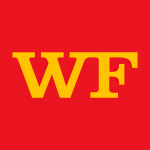Welcome to our dedicated page for Wells Fargo Co news (Ticker: WFC), a resource for investors and traders seeking the latest updates and insights on Wells Fargo Co stock.
Wells Fargo & Company (NYSE: WFC) is a financial services company that reports having approximately $2.1 trillion in assets and operating through four reportable segments: Consumer Banking and Lending, Commercial Banking, Corporate and Investment Banking, and Wealth & Investment Management. The Wells Fargo news flow reflects these diverse activities, ranging from quarterly earnings announcements to capital markets transactions and research publications.
Investors following WFC news will see quarterly financial results released via Business Wire and detailed in Form 8-K filings. These updates typically include a news release on results of operations and financial condition, a quarterly supplement with additional data, and information about conference calls and webcasts where management discusses performance and other matters relating to the company.
Wells Fargo news also covers capital and funding actions, such as the redemption of floating rate junior subordinated debentures and the establishment or issuance of medium-term notes under Series W and Series Y programs. Press releases and corresponding SEC filings describe the terms of these instruments, redemption dates, and related covenants.
Beyond earnings and funding, Wells Fargo regularly issues research and survey-based releases. Examples include surveys on financial goal setting and holiday gifting behaviors, as well as investment outlooks from Wells Fargo Investment Institute that discuss economic forecasts, favored sectors, and portfolio ideas, accompanied by extensive risk disclosures. Corporate governance and leadership developments, such as executive appointments and changes in responsibilities, also appear in the company’s news.
This WFC news page aggregates these types of announcements so readers can review earnings releases, capital markets updates, survey findings, and strategic communications in one place.
Summary not available.
The Wells Fargo Utilities and High Income Fund (ERH) has outlined the sources for its monthly distributions in a recent Notice to shareholders. Importantly, the Fund has indicated that it may have distributed more than its income and net realized capital gains, implying that some distributions may represent a return of capital. This return does not reflect the investment performance of the Fund. The estimates provided are for informational purposes only and will be finalized for tax reporting at year-end. Distributions are part of the Fund's managed distribution plan, with a minimum annual rate of 7.0%.
Wells Fargo is granting $1 million to support the AAPI community and small businesses affected by COVID-19 and rising anti-Asian discrimination. This funding will go to four organizations: National ACE, OCA, USPAACC, and Asian Americans Advancing Justice. Each will utilize the funds for various initiatives, including training for small business owners and public awareness campaigns against anti-Asian hate. This investment aligns with Wells Fargo's ongoing commitment to the AAPI community, and since 2016, the company has contributed over $140 million to related nonprofits.
Wells Fargo (NYSE: WFC) announced that CEO Charlie Scharf will present at the 37th Annual Bernstein Strategic Decisions Conference on June 2, 2021, at 8 a.m. Eastern time. A live webcast of the event will be available online, with a replay accessible for three months afterwards. Wells Fargo is a major financial services provider, boasting approximately $1.9 trillion in assets and serving one in three U.S. households. The company focuses on sustainable social impacts, including housing affordability and small business growth.
Wells Fargo (NYSE: WFC) has announced its investment in two additional African American Minority Depository Institutions (MDIs): The Harbor Bank of Maryland and Industrial Bank of Washington, D.C. This brings its total investments to 13 MDIs, fulfilling its commitment of $50 million to Black-owned banks made in March 2020. The investments aim to enhance lending capacity and community support. Wells Fargo will provide access to its ATM network and offer financial and technological support. The initiative is part of Wells Fargo's ongoing commitment to economic equity and community growth.
Wells Fargo & Company (NYSE: WFC) has appointed Ulrike Guigui as the new head of Payments Strategy, effective June 1. Guigui, with over 20 years of experience in the payment and consumer finance industry, will report to Ather Williams III, focusing on aligning the bank's enterprise payments strategy for future growth. Previously at Deloitte, she has held key positions at companies such as Mastercard and Citigroup. Her expertise is expected to bolster Wells Fargo's capabilities in providing secure and seamless financial transactions.
Wells Fargo announced new investment advisory agreements for its closed-end funds, including the Wells Fargo Income Opportunities Fund (EAD) and Wells Fargo Multi-Sector Income Fund (ERC). These changes come in light of the pending sale of Wells Fargo Asset Management to GTCR LLC and Reverence Capital Partners, expected to finalize the termination of existing agreements. Special shareholder meetings to approve the new agreements are set for July 15, 2021. These funds primarily aim for high current income, while mitigating risks associated with interest rates and market volatility.
Summary not available.
Wells Fargo (NYSE: WFC) announced the liquidation of Central Fidelity Capital Trust I and Wachovia Capital Trust II on June 21, 2021. The corresponding Capital Securities will be canceled, and holders will receive Floating Rate Junior Subordinated Debt Securities in exchange. Each $1,000 in Capital Securities will be swapped for an equivalent amount of Debentures. No action is required from Capital Securities holders, and the exchange will be managed by The Bank of New York Mellon. The next interest payment on the Debentures will include unpaid distributions from the Capital Securities.
Wells Fargo has launched its inaugural Inclusive Communities and Climate Bond, marking its first Sustainability Bond. This bond will finance initiatives focused on housing affordability, socioeconomic opportunity, and renewable energy. Led by Wells Fargo Securities, this transaction emphasizes investments in low-to-moderate income areas and diverse broker dealers. The bond, priced on May 12, 2021, offers a fixed interest rate of 0.805% until May 19, 2024, after which it transitions to a variable rate until maturity in 2025. Wells Fargo's commitment to sustainable finance aims to foster an inclusive economic recovery.

